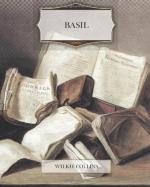I went out shortly after my sister had left me. I could give myself to no occupation at home, for the rest of that night; and I knew that it would be useless to attempt to sleep just then. As I walked through the streets, bitter thoughts against my father rose in my mind—bitter thoughts against his inexorable family pride, which imposed on me the concealment and secrecy, under the oppression of which I had already suffered so much—bitter thoughts against those social tyrannies, which take no account of human sympathy and human love, and which my father now impersonated, as it were, to my ideas. Gradually these reflections merged in others that were better. I thought of Clara again; consoling myself with the belief, that, however my father might receive the news of my marriage, I might count upon my sister as certain to love my wife and be kind to her, for my sake. This thought led my heart back to Margaret—led it gently and happily. I went home, calmed and reassured again—at least for the rest of the night.
The events of that week, so fraught with importance for the future of my life, passed with ominous rapidity.
The marriage license was procured; all remaining preliminaries with Mr. Sherwin were adjusted; I saw Margaret every day, and gave myself up more and more unreservedly to the charm that she exercised over me, at each succeeding interview. At home, the bustle of approaching departure; the farewell visitings; the multitudinous minor arrangements preceding a journey to the country, seemed to hurry the hours on faster and faster, as the parting day for Clara, and the marriage day for me, drew near. Incessant interruptions prevented any more lengthened or private conversations with my sister; and my father was hardly ever accessible for more than five minutes together, even to those who specially wished to speak with him. Nothing arose to embarrass or alarm me now, out of my intercourse with home.
The day came. I had not slept during the night that preceded it; so I rose early to look out on the morning.
It is strange how frequently that instinctive belief in omens and predestinations, which we flippantly term Superstition, asserts its natural prerogative even over minds trained to repel it, at the moment of some great event in our lives. I believe this has happened to many more men than ever confessed it; and it happened to me. At any former period of my life, I should have laughed at the bare imputation of a “superstitious” feeling ever having risen in my mind. But now, as I looked on the sky, and saw the black clouds that overspread the whole firmament, and the heavy rain that poured down from them, an irrepressible sinking of the heart came over me. For the last ten days the sun had shone almost uninterruptedly—with my marriage-day came the cloud, the mist and the rain. I tried to laugh myself out of the forebodings which this suggested, and tried in vain.




